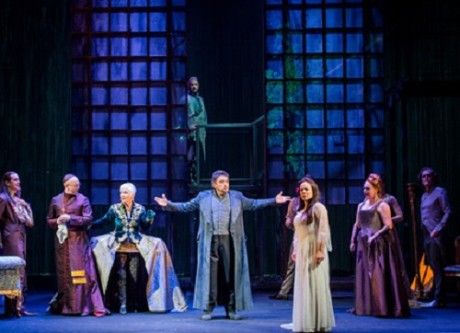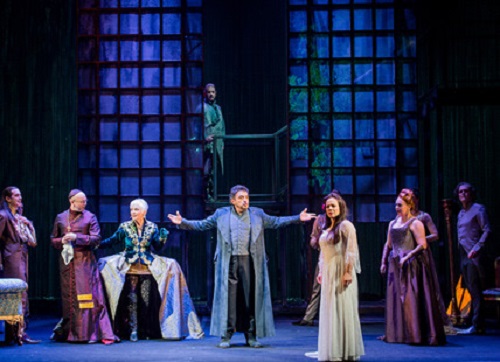 United Kingdom Giordano, Andrea Chénier: Soloists, Chorus and Orchestra of Opera North / Oliver von Dohnányi (conductor),The Lowry Theatre, Salford Quays, 19.3.2014. (RJF)
United Kingdom Giordano, Andrea Chénier: Soloists, Chorus and Orchestra of Opera North / Oliver von Dohnányi (conductor),The Lowry Theatre, Salford Quays, 19.3.2014. (RJF)

Giordano, Andrea Chénier
Cast:
Andrea Chénier: Rafael Rojas
Carlo Gérard: Robert Hayward
Maddalena de Coigny: Annemarie Kremer
Bersi: Anna Dennis
Contessa di Coigny/ Madelon: Fiona Kimm
Roucher: Phillip Rhodes
L’Abate/ an ‘Incroyable’: Daniel Norman
Mathieu: Jeremy Peaker
Schmidt: Ross McInroy
Dumas: Garrick Forbes
Pietro Fléville: Dean Robinson
Fouquier-Tinville: Dean Robinson
Production:
Director: Annabel Arden
Set and Costume Designer: Joanna Parker
Lighting Designer: Peter Mumford
I was asked at the interval as to my opinion why this opera was not often performed. In fact, this was its first ever staging by Opera North. The Royal Opera House has not staged it since 1984 until a new production by David McVicar was initiated for tenor of this generation, Jonas Kaufmann’s role debut in January 2015, with equally big voiced Eva-Maria Westbrook as Maddalena di Coigny.
In my opinion there are two answers to the question. The first asks you to look at the year of the first production, 1896. That is one year after the premiere of Puccini’s La bohème and four before his Tosca. I guess when you leave a performance of either of those two works you will have tunes or melodies rolling around your mind. I doubt that will be so after seeing a performance of Chénier. Second, the work requires big voices, and in these days of the bel canto revival there are not as many of those about, as was the case in the middle and late 1900s – let alone at the time of Chénier’s premiere.
All the above being said, like the composer’s Fedora and the works of other lesser known verismo composers such as Cilea, Catalani along with others, including the more popular Cavaleria Rusticana and I Pagliacci, they offer a musical and dramatic operatic experience well worth seeking out, a view perhaps shared if the best audience numbers of the week at The Lowry are anything to go by. The audience were rewarded by an imaginative staging, superbly lit, and allied to more than adequate big voiced characterful singing. The opera is set at the time of The Terror, the period when the French Revolution had turned, as all revolutions do when replacing despotisms, to savagery. The sets were wholly appropriate including the final act in particular when set and lighting married to portray the bleak ending of this love story. Contributing throughout were the period costumes.
As to th singing, first up was the tall figure of Robert Hayward as the conscience wracked revolutionary in love with the aristocratic daughter of the house in which he and his father served. Tall of stature, and big of voice, he made much of Gérard’s agonies of principle and conscience. His rival for the love of that daughter, Maddalena, is the eponymous poet Andrea Chénier, more her social equal. Sung by Rafael Rojas, well known by Opera North, and trained at Manchester’s Royal Northern College of Music. His voice is big and beefy if not exactly vocally elegant, but his bluff acting and singing suits the role and his contribution was much appreciated by the audience. As the apex of the love triangle, and prepared to die with the poet in the cause of love, aided by an agonizing Gérard, Annemarie Kremer was a convincing Maddalena, only very occasionally stretched by the music. All the other roles were adequately portrayed, and properly costumed, the odd vibrato and vocal spread evident when too much voice was used on one occasion to ride the orchestra expertly conducted by Oliver von Dohnányi.
Robert J Farr
